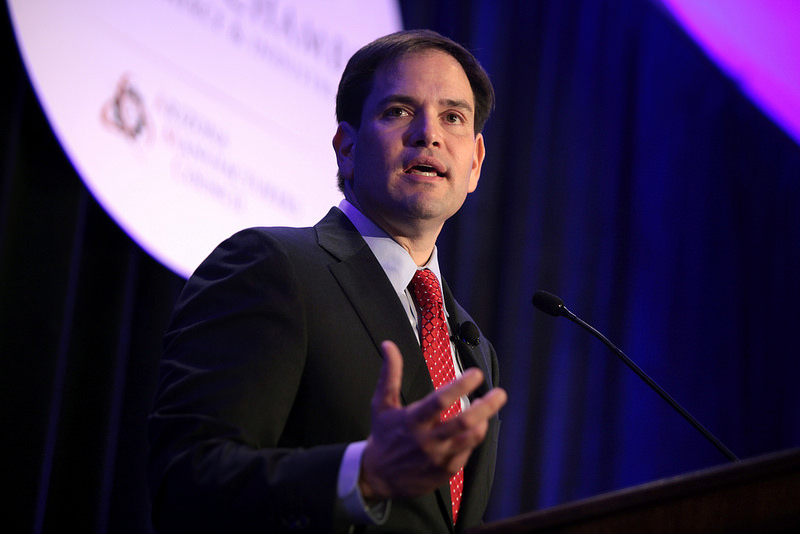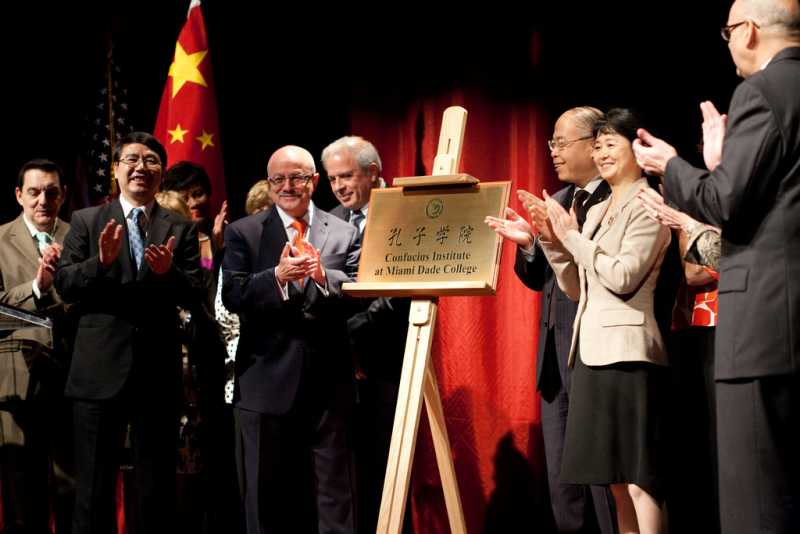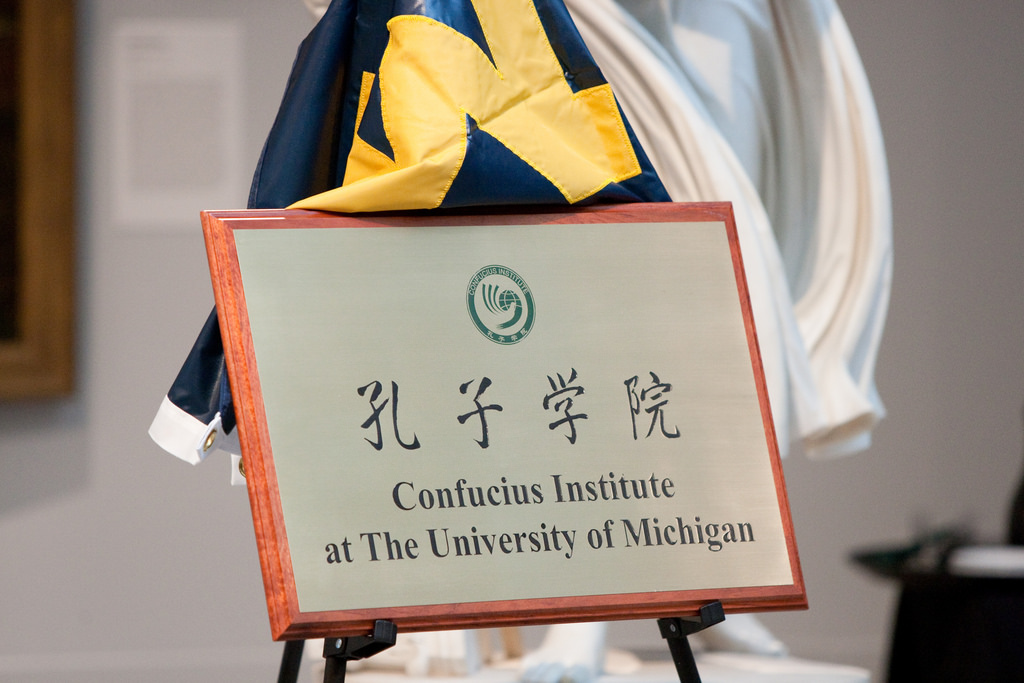US Senator Marco Rubio has challenged three Florida universities that have agreements with Confucius Institutes to hold open discussions on topics deemed sensitive by China, such as the 1989 Tienanmen Square massacre and Nobel laureate Liu Xiaobo.
“In addition to national security concerns, there remains the very real threat of censorship and self-censorship that any Confucius Institute brings,” Rubio said in a letter to the schools on Tuesday.

Confucius Institutes aim to promote Chinese culture internationally, with their teachers and teaching materials paid for by the Chinese government. But there are concerns about the institutes’ adverse impact on their partner schools in terms of academic freedom.
“Sensitive topics like Tienanmen, Tibet and Taiwan are off limits at Confucius Institutes or, if discussed, hew to the Chinese Government and Communist Party line,” Rubio said in the letter.
This article highlights why I’m concerned about the continued presence of Chinese government-run Confucius Institutes on U.S. college campuses & why I am challenging schools in FL to hold open discussions on issues considered “too sensitive” for #China https://t.co/BgdR2wWgin
— Marco Rubio (@marcorubio) May 9, 2018
He cited a 2017 report by the National Association of Scholars, which asked Confucius Institute teachers and directors what they would say when asked by students about Tienanmen Square. Several respondents said they would mention “the Square’s historic architecture,” as opposed to China’s suppression of pro-democracy protesters in 1989.
”Click to read: Rubio’s letter in full”
I write to follow up my letter of February 5, 2018, that described concerns about Chinese government-run Confucius Institutes operating at several Florida academic institutions. Since that letter, the University of West Florida and the Texas A&M System announced that they will terminate their Confucius Institute contracts. They join the University of Chicago and Pennsylvania State University, both of which terminated their Confucius Institutes in 2014, and the University of Illinois at Urbana-Champaign, which did so in 2017.
The Executive Branch and Congress continue to express growing concerns about China’s aggressive foreign influence operations, as well as a desire to bring greater transparency on the Chinese government and Communist Party’s activities here in the United States. In response to a question that I posed at a Senate Select Committee on Intelligence hearing in late February, Federal Bureau of Investigation (FBI) Director Christopher Wray said that the Bureau has “concerns about the Confucius Institutes,” and in “certain instances have developed appropriate investigative steps.” FBI Director Wray also cautioned that the Chinese government often employs non-traditional intelligence collection and is “exploiting the very open research and development environment that we have” and “taking advantage of it.” There is now legislation pending in both the House and Senate, including legislation that I introduced, to require organizations like the Confucius Institutes to register with the Department of Justice as foreign agents under the Foreign Agents Registration Act.
In addition to national security concerns, there remains the very real threat of censorship and self-censorship that any Confucius Institute brings. Sensitive topics like Tiananmen, Tibet and Taiwan are off limits at Confucius Institutes or, if discussed, hew to the Chinese Government and Communist Party line. In the April 2017 report “Outsourced to China: Confucius Institutes and Soft Power in American Higher Education,” for example, the National Association of Scholars found that when Chinese teachers and directors of Confucius Institutes were asked what they would say to a student who asked about Tiananmen Square, “several replied that they would talk about the Square’s historic architecture” as opposed to the Chinese government’s brutal suppression of pro-democracy protestors in June 1989.
In that vein and in the spirit of academic freedom, I challenge your institutions to hold open discussions or public events on these upcoming anniversaries, which are “too sensitive” for the Chinese government:
- The June 4th anniversary of the Tiananmen Square massacre, when the Chinese authorities violently suppressed pro-democracy protestors using tanks and live fire to disperse those gathered.
- The July 13th anniversary of the tragic death of renowned Chinese Nobel Prize laureate and prominent political prisoner Liu Xiaobo, who died in Chinese state custody just last year.
These are not simply hypotheticals scenarios, but rather are challenges to you and the academic institution that you lead, and are intended to underscore your own commitment to the fundamental principles of free expression and inquiry amid growing concerns about Confucius Institutes.
The senator went on to challenge the schools – Miami Dade College, the University of North Florida and the University of South Florida – to hold open discussions on June 4 and July 13, which mark the anniversaries of the Tienanmen massacre and the death of Chinese dissident Liu Xiaobo respectively.

“These are not simply hypotheticals [sic] scenarios, but rather are challenges to you and the academic institution that you lead, and are intended to underscore your own commitment to the fundamental principles of free expression and inquiry amid growing concerns about Confucius Institutes,” he said.
It was the senator’s second letter to the schools on the matter. Rubio previously wrote to them and other schools in February.
The latter schools – the University of West Florida and the Texas A&M System – have since announced that they will terminate their contracts with Confucius Institute.
‘China’s long arm’
The US government and congress have shown growing concern about China’s activities in the country. Last December, the Congressional-Executive Commission on China held a hearing on the Chinese government’s foreign influence operations in the US.
Others have also expressed concerns at Confucius Institutes. During a senate hearing in February, FBI Director Christopher Wray said his bureau has “concerns about the Confucius Institutes” and has “developed appropriate investigative steps” in certain instances.
In June 2014, the American Association of University Professors issued a report warning that Confucius Institutes “function as an arm of the Chinese state and are allowed to ignore academic freedom.”

“Specifically, North American universities permit Confucius Institutes to advance a state agenda in the recruitment and control of academic staff, in the choice of curriculum, and in the restriction of debate,” the report said.
